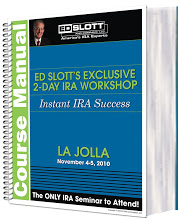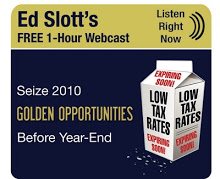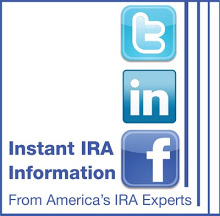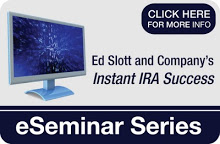This week's Slott Report Mailbag discusses some complex, timely issues involving Roth conversion tax timetables. As always, we stress the importance of working with a competent, educated financial advisor to keep your retirement nest egg safe and secure.
1.
Hello,
I am retiring in 2010. If I convert my 401(k) to a Roth IRA this year (2010), will I have to pay the split taxes in 2011 and 2012 based on my 2010 pre-retirement tax bracket or my 2011 post-retirement tax bracket? Also, can I pay all the tax in 2011 instead of splitting it between 2011 and 2012? I am also considering converting part of my 401(k) to a Roth in 2010 and part in 2011 and beyond. If I create a Roth in 2010, can I add to the same Roth in later years? How would that affect the 5-year rule as rule as would the 5 years be finished in 2015 or from the date of my last contribution?
If I retire this year and do not create a Roth, can I still create one in 2011 or beyond even though I will be retired and have no income? Is there any advantage to creating more than one Roth vs. creating a single Roth if all the money is going to be left to the same non-spouse person beneficiary? What new laws may come into effect in the next few years regarding income limits for Roth Conversion, tax percentage hikes or breaks when converting to a Roth or non-spouse Roth beneficiary rules?
Thank you,
Howard
Answer:
For Roth IRA conversions this year (2010) you have two options for paying the income tax due:
1. Add the taxable conversion amount to your 2010 income and be done with the income tax aspect. You will be taxed at your bracket in 2010.
2. If you elect to not use option 1, you can spread half the taxable conversion amount to your 2011 return and half to your 2012 return. You will be taxed at the rates in effect for 2011 and 2012. Those are the only two options. If you want to pay all the tax in 2011, then you should do your conversion in 2011.
If you think your income will be significantly lower in 2011 and 2010 because of your retirement you might want to use option 2. However, if you are concerned about tax rates rising in 2011 and 2012, you can use option 1. You can always add other conversion amounts to your Roth IRA. Your first Roth IRA will be the measuring period for the five-year rule for taxation of earnings; subsequent conversions will NOT restart the holding period.
You cannot contribute to a Roth IRA unless you have earned income, but you can still convert your IRA or 401(k) funds to a Roth IRA. You do NOT need earned income to do that.
Many individuals use separate accounts mainly in case they want to recharacterize later and some just to invest differently for different beneficiaries.
The tax laws are always changing as well as tax rates. Stay tuned to our web site, www.irahelp.com, to keep up to date. At this time, non-spouse beneficiaries cannot convert inherited IRAs to Roth IRAs, but 401(k) beneficiaries can do a conversion.
2.
I would appreciate any insight on this matter: Presuming a person is already older than 70 1/2 years old and must take annual IRA distributions. During 2010, this person takes a portion of his IRA or her IRA and converts to a Roth. There had never been a Roth before this. During 2011 and for the next four years, does this person not have to take part of the Roth as a minimum distribution? Although only the income on this money will be taxed, as the account cannot be a Roth for 5 years, does this not imply that it is still part of the IRAs which have a RMD associated with them?
Thank you!
Answer:
Good question. When you are age 70 1/2 and over you have annual required minimum distributions (RMDs) that must come out of a traditional IRA. In the year of conversion, your RMD must come out first before the conversion. If your RMD is converted to a Roth IRA you have an excess contribution in the Roth IRA that must be removed following special rules for excess contributions. Once you have converted to a Roth IRA, you no longer have any RMDs on those funds during your lifetime. The five-year holding period has no impact on RMDs.
By IRA Technical Consultant Marvin Rotenberg and Jared Trexler
------------------------------------------------------------------------------
Comment, Question, Discussion Topic on your mind? Click on the Blue Comment Link below and leave your thoughts then check back to see what other consumers and advisors think.
*Copyright 2010 Ed Slott and Company, LLC
Thursday, September 9, 2010
Roth Conversion Tax Timetables Highlight Mailbag
Subscribe to:
Post Comments (Atom)
















0 comments:
Post a Comment